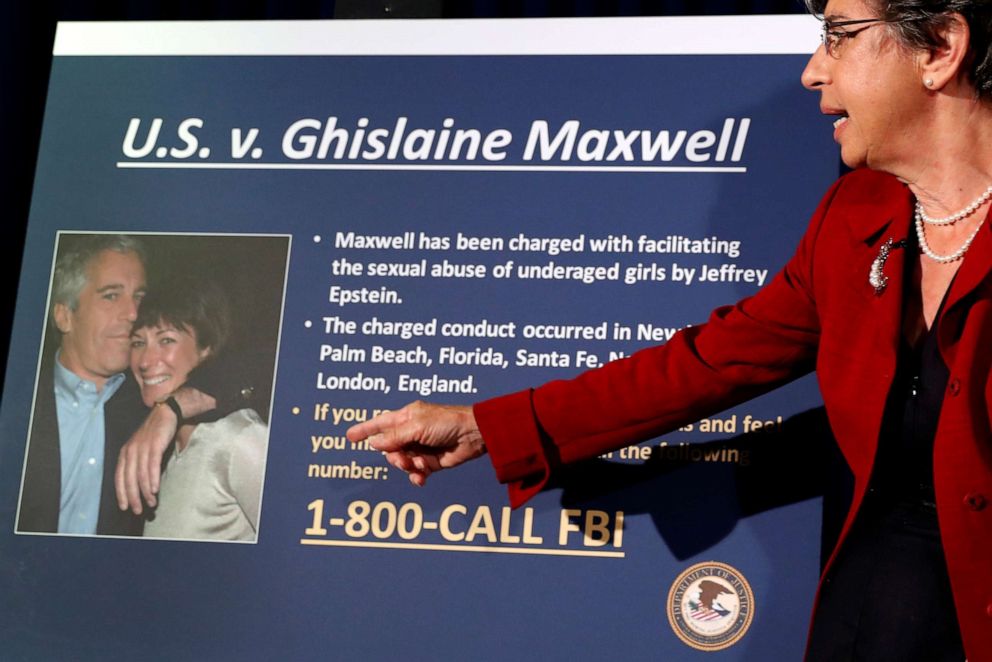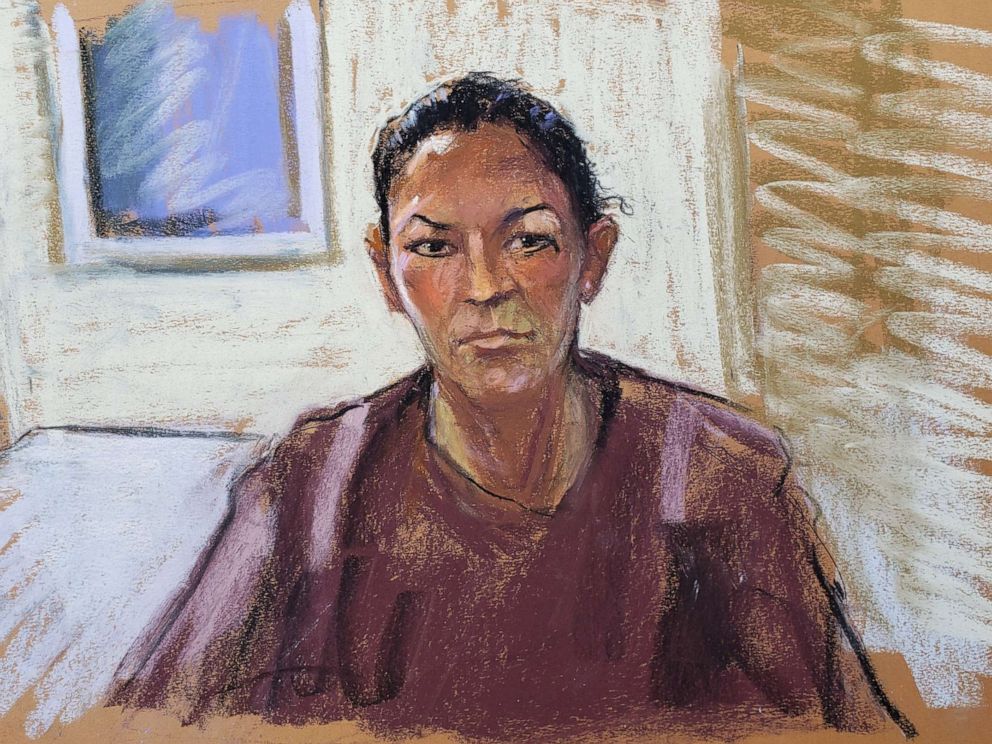Judge puts civil lawsuit against Ghislaine Maxwell on hold
To continue "would adversely affect" the criminal prosecution, they argued.
A federal magistrate judge overseeing the only active civil lawsuit against Ghislaine Maxwell and the estate of sex-offender Jeffery Epstein has ordered a temporary hold on the case until Maxwell's criminal case is complete, finding that Maxwell's right to a fair trial outweighed the alleged victim's pursuit of a timely resolution of her claims.
"Should discovery in the civil action proceed, Maxwell would be forced to decide whether to defend herself by making pretrial disclosures and giving deposition testimony ... or to invoke her 5th Amendment privilege against self- incrimination," wrote U.S. Magistrate Judge Debra Freeman in her order this week. "This legitimate concern, made more real and immediate by the active posture of [the] criminal case, militates in favor of a stay."
Federal prosecutors had asked Freeman earlier this month to halt proceedings in the lawsuit, which was filed in January by an alleged child sex-abuse victim against Maxwell and Epstein's estate. Prosecutors told the judge that there is a "significant risk" that proceeding with the case "would adversely affect the ongoing criminal prosecution against Maxwell."

In a letter from Audrey Strauss, the Acting U.S. Attorney for the Southern District of New York, prosecutors asserted that there is a "factual overlap between the civil and criminal cases" that could result in premature disclosure of evidence and testimony from witnesses who may be called upon in both cases.
"Such witnesses may be forced to testify about any efforts to assist the criminal investigation and prosecution, and may thereby expose facts about the investigation ... and could potentially expose witnesses and/or their families to harassment," the government's letter states. "Moreover, permitting any discovery to proceed in this lawsuit would enable Maxwell to seek a preview of trial testimony in the criminal case, and would afford her with a broader array of discovery than she is entitled to in the criminal case."
The civil lawsuit, filed under the pseudonym Jane Doe, contains allegations that are substantially similar to those contained in the criminal indictment against Maxwell, who allegedly groomed three minor girls to be abused by Epstein between 1994 and 1997 and, in some instances, participated in the abuse herself, according to prosecutors. Maxwell has pleaded not guilty to the charges and has denied the allegations in the civil suit.
In its letter to the court, the government declined to address speculation Maxwell's attorneys have raised in court filings that Doe is one of the alleged victims identified in the criminal case. Doe's attorneys have declined to comment on the apparent parallels to the criminal case.
By advocating for a stay in the civil case, the government found itself, in this instance, aligned with Maxwell and the co-executors of Epstein's estate, who had been arguing for months that the case should be placed on hold while criminal investigations of Epstein's alleged co-conspirators remain open.
"Absent a stay, Ms. Maxwell will be forced to choose between her constitutional right to remain silent and her active and vigorous participation in defending against and refuting [Doe's] false claims in this case." wrote Maxwell's lawyer, Laura Menninger, in a letter to the court earlier this month.
Doe's lawyers had opposed those efforts, arguing in court filings that a stay would "simply delay long overdue justice."
"[Doe] is seeking to hold defendant Maxwell accountable for the heinous and sick sexual acts she committed against [her] over the course of several years while [she] was just a child," wrote her lawyer, Robert Glassman of Panish, Shea & Boyle, LLP in a letter to the court. "[She] is best served by pressing forward with her claims -- not waiting even longer for justice."
Of more than 30 women who brought legal claims against Epstein's estate following his death last year, Doe was the only accuser who had declined to voluntarily put her lawsuit on hold to pursue an alternative resolution via the Epstein Victims' Compensation Fund, a non-adversarial program established by the estate that began evaluating claims in June.

Doe alleges in her complaint that she was first approached at age 13 by Epstein and Maxwell in 1994 at a summer camp at the Interlochen Center for the Arts in Michigan and that a months-long grooming process by Epstein and Maxwell continued after she returned home to Florida.
Doe, now 40, alleges that the sexual abuse by Epstein escalated over the next few years as Epstein and Maxwell asserted control over her life. She claims she was sexually abused at Epstein's homes in Florida, New York and his ranch in New Mexico, and that she would often travel to those locations with Epstein and Maxwell on one of Epstein's private jets.
"Epstein's system of abuse was facilitated in large part by his co-conspirator and accomplice, Maxwell, who helped supply him with a steady stream of young and vulnerable girls," the complaint said. "During Doe's time in New York, Maxwell also regularly facilitated Epstein's abuse of Doe and was frequently present when it occurred."
Maxwell formally requested a stay in Doe's case last month, arguing that Doe had failed to articulate a "cogent reason" for wanting to press ahead with her lawsuit while the criminal case is ongoing and while Doe can choose to present her claims to the estate's compensation fund.
"If it is money she seeks, she can pursue it in the claims program," Menninger wrote in a letter to the court last week. "If it is 'justice' she seeks, the criminal case will resolve those issues one way or the other."
Doe's lawyers countered that a stay of the case would deprive her and the public with an opportunity to learn long-hidden information about Epstein's alleged criminal sex-trafficking operation, and Maxwell's alleged role in it.
"The continuation of this last remaining civil avenue can furnish the public with critical information as to defendant Maxwell's well-known criminal enterprise, how it was operated and all those involved. A stay of the civil proceedings would provide what defendant Maxwell has sought for years -- concealing her heinous acts from public view," Glassman wrote to the court last month.
Judge Freeman was unpersuaded, determining that the public interest is best served by "protecting the integrity of criminal proceedings."
"Overall, and despite [Doe's] assertion that a stay would work to her disadvantage, this Court finds that any generalized prejudice that she would suffer as the result of a stay is not sufficient to counterbalance the other factors that the Court should consider, which all heavily favor a stay," Freeman wrote.




